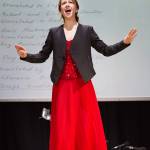Reserve your free ticket here (click the link).
The Translation performance is a product of Olga Jitlina’s collaboration with opera singer Yulia Averina, piano player Ekaterina Kaucsh, the Lampedusa in Hamburg group of refugees and asylum seekers residing in Tampere.
Translation is a performance which represents an imagined collective interview of a group of asylum seekers with a European official on the subject of their legal status. It is on the basis of such individual interviews that decisions of whether to grant or deny refugee status are made. The criteria for the decision include a true description of the circumstances and reasons why protection in Europe is sought.
Translators are provided for applicants who cannot speak the host country’s language. However, it is frequently the case that the applicant is asked to repeat accounts of events multiple times during the course of the application process. Although originally consistent, these accounts are translated differently, which gives an impression that the applicant is giving inconsistent and misleading accounts. As a consequence, the application may be rejected. The question of translation can become a matter of life or death.
In the performance, the role of translator is performed by opera singer Yulia Averina. She tries to “translate” the extreme experiences of crossing seas and deserts, of political subjectivation and struggle to the language of European opera.
The collective story that the refugees are telling is mainly based on Andrey Platonov’s novel Dzann (“Soul” in English translation). It narrates a story about a nation consisting of outcasts of different ethnic groups dying from poverty somewhere in a desert in Turkistan. The protagonist, Nazar Chagataev, has to rescue his people from hunger and poverty and lead them toward a collective happiness.
The performance is conducted in five different languages. Trying to construct one narrative out of many languages, the performance aims at a utopian goal of reaching a universal language, which might have existed before the fall of the Tower of Babel, or at the mystical effect of glossolalia where, driven by the same goal, we would suddenly start to understand each other’s foreign languages.
The performance forms part of the activities of the research project Spaces of Justice across the East-West Divide funded by the Kone Foundation and the Faculty of Management (University of Tampere). It is included in the programme of the Art/Research Festival, which the project organizes at the University of Tampere in May 3–4. Reserve your free ticket to the performance here (click the link).


Comments